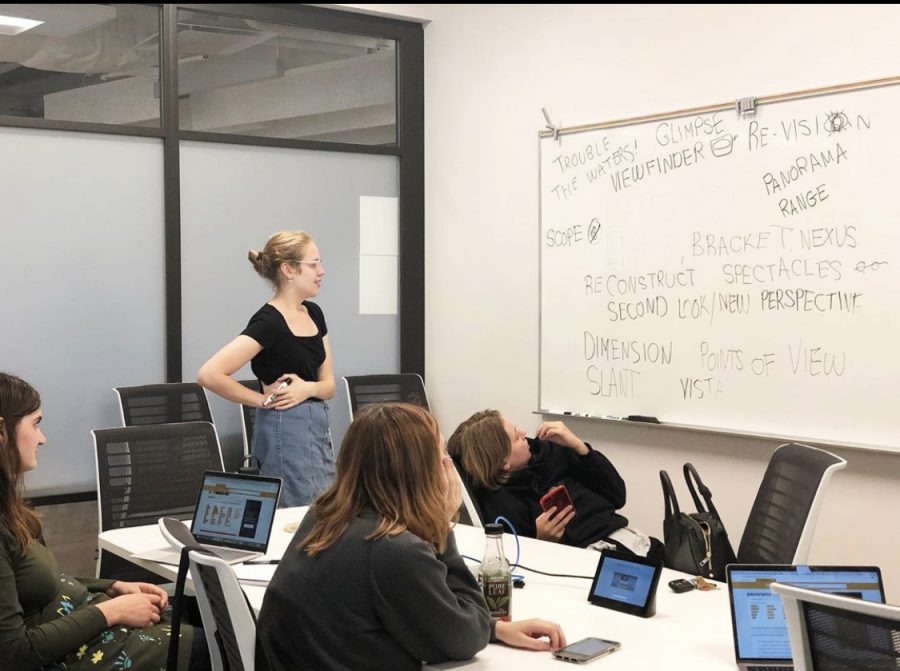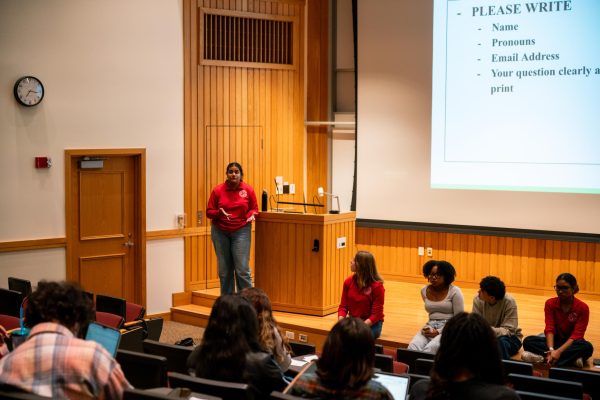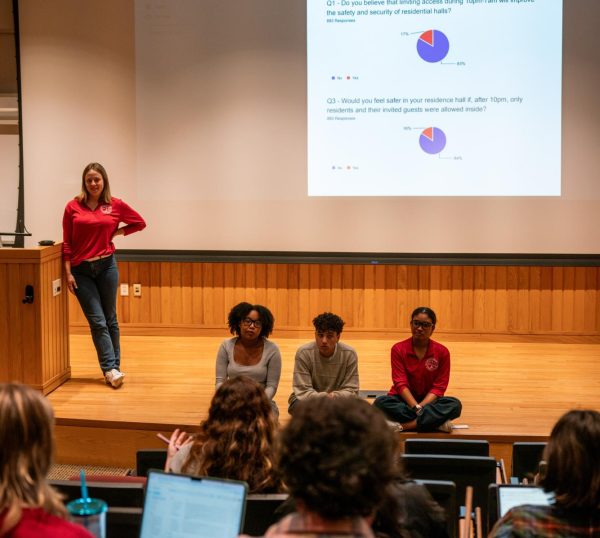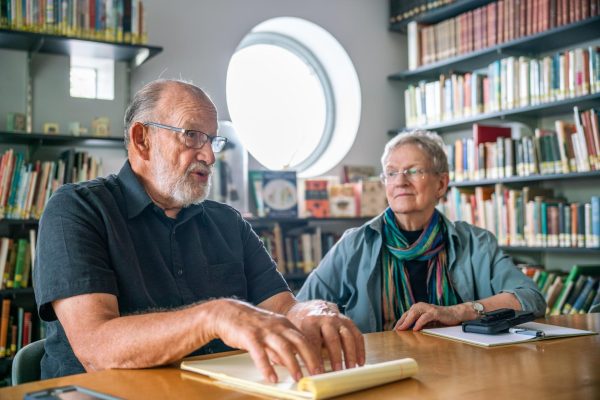New Research Journal Challenges Convention
The editorial board of On Second Thought, Oberlin’s new undergraduate history journal, lay out a strategy for the new publication.
Under the leadership of Assistant Professor of History and Comparative American Studies Tamika Nunley, a four-student editorial board is launching On Second Thought, a research journal designed to publish “unorthodox” historical research by Oberlin students.
The journal’s origins lie with Nunley, who envisioned On Second Thought as an opportunity for students to explore and expand the conventions of historical writing in a less demanding setting than undertaking an honors thesis. She hopes it will become a venue for students to take risks and grow.
“I think that when students have the audacity to come up with an innovative idea or an innovative point of inquiry, that it’s in our best interest as faculty to meet them where they are and find out how to support them,” Nunley said. “I find that I become a better teacher … and I’m helping to fulfill the mission of the ins titution.”
College fourth-year Grace Winters and College third-year Julia Rohde, both History majors, are the journal’s editors-in-chief. Along with Nunley, they both emphasized that non-History majors should feel comfortable submitting w ork.
“I think the exciting thing is trying to expand how we define history,” Rohde said. “I’ve been thinking a lot about what the academic discipline considers history … and I think it’s exciting to call on people to reconsider that for themselves, with regard to their work.”
The journal’s call for submissions echoes this desire to engage in unconventional historical writing.
“On Second Thought is a journal for historical writing that moves beyond the limits of traditional academia,” it reads. “We believe that people are engaging with history now more than ever through popular culture; by listening and reacting to podcasts like Stuff You Missed in History Class and watching movies such as Harriet, we are participating in the creation of historical narratives and ideas.”
In particular, On Second Thought’s first issue will feature “an examination of oral history work done in the town of Oberlin,” as well as history-focused reviews of books, art, and multimedia works. Submitted pieces aren’t meant to be overly long, and they will certainly be much shorter than the typical 50–70 page honors thesis.
Winters views the journal’s work — in part — as responding to the changing ways that students and academics engage with history.
“A lot of what we talked about in our meetings about the journal is that history is everywhere,” she said. “We wanted to make it about, not modern history, but about modern ways of learning about history. … Traditional academic texts don’t include everyone’s history.”
Nunley agreed, adding that many students don’t realize the degree to which their work engages historical concepts.
“What you find is that most people are interacting with history to some extent, but haven’t really thought about it because we’ve created these very clear parameters around what constitutes history,” she said.
Despite being an undergraduate journal, On Second Thought’s review and editing process largely mirrors that of a typical, peer-reviewed academic journal, according to Nunley.
“We are taking that same notion [of peer review] and saying that the students who are on the editorial staff for the journal will be the peers that review the work,” Nunley said. “When they review the work, if it fits within the mission of the journal — which is to feature pieces of scholarship that engage with historical themes and alternative methodologies — they will return the manuscript with revisions and suggested feedback. … Once they’ve revised it to their liking, we’ll proceed with publication.”
On Second Thought is housed within the History Design Lab, another of Nunley’s initiatives. According to Nunley, the lab’s primary purpose is to cultivate projects that “engage with alternative historical methodologies,” in much the same way the new journal does. She particularly highlighted the potential for promoting greater academic collaboration between the College and Conservatory.
While On Second Thought will become Oberlin’s only undergraduate research journal, similar publications exist across the country. One of these is the Midwest Journal of Undergraduate Research. Founded in 2010, the MJUR is edited by students at Monmouth College, but publishes work from students across the country.
“I think that having journals like you all are creating at Oberlin helps celebrate the fact that there is high-quality work that is being done by undergraduates,” said MJUR Coordinating Editor Hadley Smithhisler. “Maybe it’s not the most cutting edge or the most radical or the most original work that has ever been done — but there is significant intellectual work and research and scholarly efforts that are being made by undergraduates.”
According to Rohde, Nunley has played a key role in highlighting this kind of undergraduate research at Oberlin and pushing it to higher levels.
“What I really respect about her as an educator and mentor is that she really wants to empower her students and force them to ask difficult questions,” Rohde said. “People are doing a lot of very engaging stuff within their majors here — and I think [Nunley] recognizes that.”
For now, On Second Thought will focus on work produced in Oberlin, rather than drawing submissions more broadly. Nunley added that the journal will publish annually, in order to preserve a high quality of work.
“With most of my projects with undergraduates, I’ve really honed in on depth rather than scope,” Nunley said. “I think that we live in a world where we celebrate when people do a hundred things at once. I really want to get us back to thinking more deeply about what it is we’re talking about.”
Students interested in submitting to On Second Thought can email a draft to [email protected] by Dec. 1. at 11:59 p.m.






